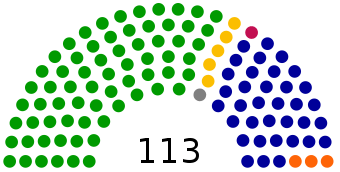Taiwan presidential election, 2000
| | ||||||||||||||||||||||||||||||||||||||||||||||||||||||||||
| ||||||||||||||||||||||||||||||||||||||||||||||||||||||||||
| ||||||||||||||||||||||||||||||||||||||||||||||||||||||||||
|
| ||||||||||||||||||||||||||||||||||||||||||||||||||||||||||
| ||||||||||||||||||||||||||||||||||||||||||||||||||||||||||
| This article is part of a series on the |
| Politics of the Republic of China |
|---|
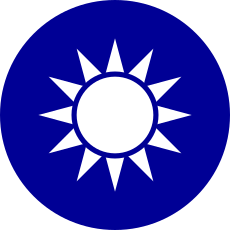 |
| Commonly known as Taiwan |
|
Leadership |
|
|
|
Other branches 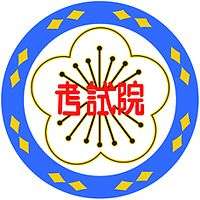
|
|
Related topics |
|
|
The second ever direct presidential election was held in Taiwan on March 18, 2000, to elect the 10th-term President and Vice-President of the Republic of China under the 1947 Constitution. With a voter turnout of 82.69%, Chen Shui-bian and Annette Lu of the Democratic Progressive Party were elected president and vice president respectively with a slight plurality. This put an end to more than half a century of Kuomintang rule on Taiwan.
Candidates and platforms
Kuomintang
The ruling Kuomintang ran Vice President Lien Chan for President and Premier Vincent Siew for Vice President. Both were career civil servants and Lien, originating from the Taiwanese aristocracy, was seen as aloof and unable to empathize with the common people.
Though more popular and consistently ranked higher in the polls, the outspoken former Taiwan Governor James Soong failed to gain the Kuomintang's nomination. As a result, he announced his candidacy as an independent candidate. The Kuomintang responded by expelling Soong and 21 of his allies in November 1999. It is a very common belief among KMT supporters that President Lee Teng-hui was secretly supporting Chen Shui-bian, and purposely supported the less popular Lien in order to split the Kuomintang, and this belief was given a great deal of credibility after the 2000 election with Lee's defection to the Pan-Green coalition, though Lee's defection came only after his humiliating expulsion by the KMT. Soong, a mainlander, tried to appeal to the native Taiwanese by nominating pro-independence surgeon Chang Chao-hsiung as his running-mate.
In December 1999, the KMT began to attack Soong's integrity. They sued Soong for theft, alleging that as party Secretary-General, he stole millions of Taiwan dollars in cash intended for the family of the late President Chiang Ching-kuo and hid the money in the Chunghsing Bills Finance Co. Soong defended himself by saying he was acting under Lee's direction, but his story was largely unpersuasive. Initially holding a commanding lead in the polls, Soong lost by just over 300,000 votes, and the financial scandal that tarnished his image as a clean politician likely led to this outcome.
Democratic Progressive Party
The Democratic Progressive Party ran former Taipei Mayor Chen Shui-bian and Taoyuan County magistrate Annette Lu for vice president. Having run for the 1996 election on a radical independence platform and lost by a landslide, the DPP in May 1999 moderated its stance by issuing the "Resolution on the Future of Taiwan." The resolution accepted the status quo and promoted the moderate view that Taiwan was already independent, so any formal declaration would not be urgently necessary, if at all. Also included was the pledge that any change in Taiwan's international status will have to be done through a referendum, thus alleviating the fear that, if elected, a DPP government would unilaterally declare independence without popular approval. The Chen-Lu ticket also promised to be more aggressive in fighting black gold, to provide more funding for social services, and to be more environmentally friendly, such as opposition to nuclear power. The last minute public endorsement of Chen Shui-bian by President of the Academia Sinica and Nobel laureate Yuan T. Lee and other opinion leaders is also thought to have played a role in his election.
Other candidates
All independent presidential tickets were required to turn in a petition of 224,000 names to the Central Election Commission to confirm their candidacy and appear on the ballot.[1]
Former Democratic Progressive Party Chairman Hsu Hsin-liang, who had quit the party after failing to prevent Chen from running, ran as an independent with New Party legislator Josephine Chu as his running mate. As DPP Chairman, Hsu had moderated the platform of the party, promoting reconciliation with the People's Republic of China and the opening of direct links, a move, ironically, not supported by President Lee. During the 2000 campaign, the Hsu-Chu ticket promoted reunification under 'one country, two systems' and opposed a referendum on independence.
The New Party nominated independent social commentator Li Ao—an acclaimed author, historian, and former political prisoner—for president and legislator Elmer Fung for vice president. Li, who supported 'one country, two systems', said he took the election as an opportunity to "educate" the people in Taiwan. Both he and his party publicly encouraged people to vote for James Soong to the point of stating during the televised presidential debates that he was not planning to vote for himself and that people should vote for Soong so that the pro-reunification vote would not be split.[2]
All of the candidates promised to work towards opening the Three Links, a largely popular measure.
Shortly before the election, Zhu Rongji, the premier of the People's Republic of China attempted to influence the outcome, warning that China would not "sit idly by" if Taiwan moved towards independence and that "independence means war". Following the election, Chinese analysts reached the conclusion that the statements of Chinese government had actually been counterproductive and helped Chen to win; consequently, China avoided making such an open attempt to influence the 2004 elections.
Result
The Soong-Chang ticket appeared first on the ballot, followed by the Kuomintang's Lien and Siew, then two independent tickets, Li-Fung and Hsu-Chu. The eventual winning Democratic Progressive Party ticket of Chen and Lu were listed fifth.[3]
| Political affiliation | Candidate | Votes | ||||
|---|---|---|---|---|---|---|
| President | Vice President | Total votes | Percentage | |||
| Chen Shui-bian |
Annette Lu | 4,977,737 | 39.3% |  | ||
| James Soong | Chang Chau-hsiung | 4,664,932 | 36.8% |  | ||
| Lien Chan | Vincent Siew | 2,925,513 | 23.1% |  | ||
| Hsu Hsin-liang | Josephine Chu | 79,429 | 0.63% |  | ||
| Li Ao | Elmer Fung | 16,782 | 0.13% |  | ||
| Total | 12,786,671 | 82.69% voter turnout | ||||
| Valid votes | 12,664,393 | |||||
| Invalid votes | 122,278 | |||||
Aftermath
Chen's victory was almost unthinkable before Soong's financial scandal broke out. Under the first-past-the-post voting system, the split of the KMT vote between James Soong and Lien Chan, who together polled nearly 60% of the vote (compared to Chen's 39%), played a large role in the Taiwan independence-leaning candidate Chen's victory. Soong Chu-yu's financial scandals, Nobel laureate Lee Yuan-tseh's endorsement, and arguably the last minute saber-rattling by the PRC tipped the balance to Chen's favor.
As the results were announced, several thousand protesters, mostly KMT royalists believed Lee Teng-hui had intentionally tried to sabotage the pro-reunification vote, gathered outside the KMT headquarters in Taipei and demanded Lee resign as Chairman. Lee promised to resign at the party congress in September 2000, but this was not enough. Though the protest was without permit and technically illegal, the government did not break it up and Taipei Mayor Ma Ying-jeou joined the crowd on the first night. The protesters blocked the entrances to the building and kept Lee holed in his office for hours until riot police with water cannon were able to open a path for the motorcade. Protesters also dragged presidential advisor Hsu Li-teh out of his car and beat him. The protests ended in success on March 24 when Lee resigned as KMT Chairman and was replaced by Lien.
On the same day, Soong announced the formation of the People First Party. In the following party congress, Lien Chan was able to achieve Lee's expulsion and began to move the party back towards a unificationist platform. Lee and his supporters later formed the radical pro-independence Taiwan Solidarity Union. Lee was expelled from KMT on 21 September 2001.
To avoid a repeat of the 2000 split, Lien and Soong agreed to run on a single ticket as president and vice president, respectively, in the 2004 election. They made the announcement on Valentine's Day 2003, more than a year before the next presidential election. But they were still defeated by Chen Shui-bian in the next election.
References
- ↑ "Candidates face signature deadline". Taipei Times. 5 January 2000. Retrieved 30 September 2016.
- ↑ Prelypchan, Erin (12 March 2000). "Li Ao backs Soong, but Hsu hangs on". Taipei Times. Retrieved 30 September 2016.
- ↑ Lin, Chieh-yu (15 February 2000). "Soong draws top ticket lot". Taipei Times. Retrieved 30 September 2016.

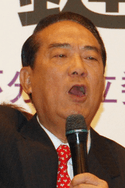
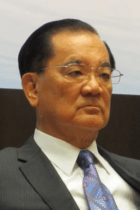
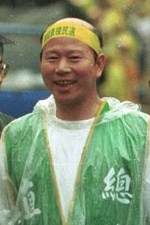
.svg.png)
